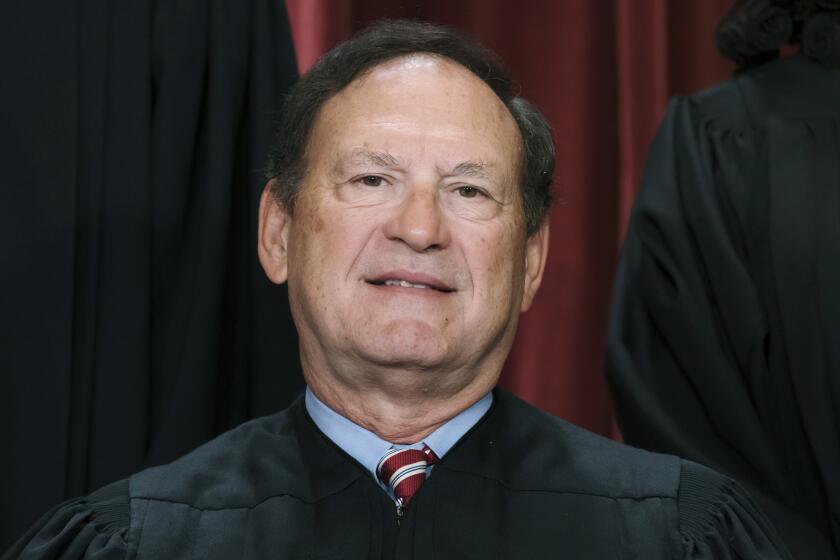Column: The Supreme Court’s all-important Jan. 6 decisions will be tainted

America, we have a(nother) constitutional crisis on our hands.
Amid all the well-warranted attention to Justice Samuel A. Alito Jr., who refuses to recuse himself from Jan. 6 cases despite reasonable doubt about his impartiality, spare some also for his equally ethics-challenged colleague Clarence Thomas, who’s stiffed similar recusal demands for more than two years.
Opinion Columnist
Jackie Calmes
Jackie Calmes brings a critical eye to the national political scene. She has decades of experience covering the White House and Congress.
Within weeks, the Supreme Court will decide two cases related to the unsuccessful 2021 insurrection and to Donald Trump’s role in events. No matter how the court decides, the outcomes will be widely questioned — because of the polluting participation of Alito and Thomas, the court’s most far-right members. And that’s a problem for a court whose public approval rating is already at historical lows in polls.
We now know that both justices’ spouses — the flag-loving Martha-Ann Alito and “Stop the Steal” foot soldier Ginni Thomas — have amply demonstrated their pro-Trump bias in ways that could not, and surely did not, go unnoticed by their husbands. Consequently, Justices Alito’s and Thomas’ “impartiality might reasonably be questioned” — the standard for recusal under toothless federal law — in cases involving Trump.
Samuel Alito said his wife was responsible for flying an upside-down flag over his home and an ‘Appeal to Heaven’ flag at his New Jersey beach house.
The objectivity of the full court, with its 6-3 right-wing supermajority, is suspect as well. In one of the two pending cases, the one involving Trump’s claim of immunity from criminal prosecution, the court has dragged matters out so long that he almost certainly won’t be tried before the 2024 election for trying to overturn Joe Biden’s 2020 victory.
That makes the court complicit — in appearance and probably in fact — in Trump’s unsubtle legal strategy: delay, delay, delay. How much of that foot dragging owes to Alito and Thomas? We can’t know, because of the court’s secretive inner workings. But we can reasonably question.
Chief Justice John G. Roberts Jr. is doing his part to maintain the court’s opacity. On Thursday he wrote to Sens. Richard J. Durbin of Illinois and Sheldon Whitehouse of Rhode Island, the chairmen of the Senate Judiciary Committee and its subcommittee on federal courts, respectively, rejecting their request to meet about court ethics. Roberts cited judicial independence and the separation of powers.
Chief Justice Roberts declines to meet with Democratic senators to talk about Supreme Court ethics and the flags that flew outside Justice Alito’s homes.
The chief can’t claim the high ground when his colleagues keep digging from below.
First, consider Alito, the scofflaw of the moment. The New York Times has reported that separate flags associated with groups that attacked the Capitol flew over his home outside Washington and at a beach getaway in New Jersey. Alito blames his wife, leaving more bus tracks on her back each time he addresses the matter, and absolves himself.
“No involvement whatsoever,” he said in a brief email to the New York Times, for its first story on the upside-down U.S. flag that waved at his house for days in January 2021, after the attack on the Capitol. Alito gave no response to the newspaper for its second story about a flag favored by pro-Trump Christian nationalists that fluttered at his beach house last summer. Yet he gave friendly Fox News an interview, and claimed his wife was provoked by a venomous spat with an anti-Trump couple on their block — an account that couple contradicted in a third New York Times story that was partly corroborated by neighbors, contemporaneous texts and a police report.
Flags adopted by Trump partisans flew at Samuel Alito’s homes. Like his colleague Clarence Thomas, he has been brazen and unapologetic in ignoring ethical standards.
When Alito wrote to Durbin and Whitehouse, rejecting their request that he recuse from 2020 election cases, he said he’d asked his wife for several days to remove the inverted flag, but she refused. He emphasized his wife’s autonomy, her co-ownership of their house and her constitutional rights — and his own impotence: “There were no additional steps I could have taken to have the flag taken down more promptly.” Are justices so used to being catered to that Alito couldn’t take it down himself?
Now a brief refresher on Ginni Thomas’ shenanigans, which similarly elicited professions of cluelessness, powerlessness and respect for her independence from her hubby.
If you oppose right-wing activism among federal judges and justices, vote strategically in November.
For weeks after Biden’s election, Ginni Thomas texted White House Chief of Staff Mark Meadows, forwarding conspiracy theories and imploring him to keep up the fight for Trump: “Do not concede. It takes time for the army who is gathering for his back.” She contacted Arizona Republicans to promote the fake electors scheme. On Jan. 6 she wrote on Facebook, “LOVE MAGA people!!!!” She joined in damning the House Jan. 6 committee as a “political persecution” of “citizens who have done nothing wrong.” And she condemned then-Vice President Mike Pence for certifying Biden’s election.
What did Clarence Thomas do? He repeatedly participated in Jan. 6-related cases and invariably sided with the pro-Trump parties.
Together the Thomas and Alito scandals underscore the revolting sense of impunity at the court among its life-tenured justices. Most public figures, those answerable to the voters, show some humility and remorse in the face of evident wrongdoing or embarrassment (at least they used to). Not these justices.
When these justices deign to meet-and-greet, it’s with people who won’t ask them about conflicts of interest or gifts from billionaires.
Part and parcel of their impunity is a petulant refusal to be accountable for their partners’ actions, when those activities cast the justices’ own fairness into doubt. Journalists can throw this stone: Reporters enter their careers accepting that they can’t sport political bumper stickers, lapel buttons, yard signs or flags, and they certainly can’t work for political causes. It’s not ethical. If a spouse works in politics, the reporter avoids covering stories their partner is involved in. I still live by the limits though I became an opinion columnist several years ago. In the decades I reported on Congress, the White House and campaigns, those in my household respected them as well.
It’s not too much to expect that justices demand their spouses do the same.
Alito and Thomas disagree. And so they, with Roberts, bring disgrace on the court. When the court soon rules on the Jan. 6 cases, its decisions will be historic not only for the substance but for the fact that two such conflicted justices took part. Shame on them.
More to Read
A cure for the common opinion
Get thought-provoking perspectives with our weekly newsletter.
You may occasionally receive promotional content from the Los Angeles Times.

















